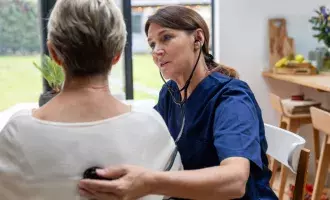This month at Capita’s CHKS we carried out an analysis of the 30 most recent Care Quality Commission (CQC) care home inspections because we wanted to establish whether there is a link between having clear systems, process and standards agreed and acted upon and overall organisation performance.
We found that when the CQC rated organisations as requiring improvement, the majority did not have the foundations in place to deliver good care and a quality improvement culture.
Even before care homes hit the headlines during the Covid-19 pandemic, there was evidence they were struggling. In 2018, 3,000 of the country's 14,975 care homes were rated either inadequate or needing improvement by the Care Quality Commission. The CQC said the variability in standards of care across the country was "a real concern".
In our analysis of the 15 care homes rated inadequate by the CQC, 13 inspections raised concerns about a lack of systems, process and standards that are designed to enable staff to do their work effectively and keep residents safe.These include systems and processes around care planning, medicines management and appropriate staff training.
In many of the inspections where care homes were deemed to require improvement, a lack of standards around keeping up to date records was noted. Specific examples include; care files not containing clear and up to date guidance to enable staff to meet residents’ needs, records not being updated to reflect guidance from health professionals and a lack of available evidence to prove that risks to people had been assessed, recorded and appropriately managed. The CQC also found that where risks to people’s well-being and safety had been assessed and risk-management was put in place, there was not always clear guidance documented for staff on how to mitigate these risks.
We know from our work with organisations on the accreditation journey that there is a link between good organisational management, and always looking to improve, which sets the culture. We have found that those organisations offeringa supportive, transparent and no blame culture have a clearer path through the accreditation process. We also know that once organisations have been accredited,the journey of staff engagement and improvement has, in turn, improved the culture.
A good example of this is the Children’s Trust, the UK’s leading charity for children with brain injury and neurodisability. Following a Government review into the self-regulation of charities and changes to CQC standards, both in 2015, the organisation knew challenges lay ahead and that big changes would be needed. Introducing accreditation through CHKS enabled it to embed a culture of continuous improvement.The impact of the charity was significant and in 2018, it was rated outstanding by the CQC in a further inspection. It's clear that successful accreditation requires a culture shift so everyone within the organisation, including senior leadership needs to be involved.
We were therefore not surprisedwhenour analysis also uncovered a link between the CQC inadequate rating and concerns over organisational culture. In some cases there was a lack of communication between staff and management, borne out in a lack of staff morale which was clear to see, not just by those employed at the home but by residents and relatives too.
A change in culture can lead to improved care
We alsodiscovered that where the CQC found improvement was needed, the effectiveness of leadership and management wasoften called into question. In one organisation, inspectors highlighted the fact that service management and leadership was inconsistent and that the leaders and the culture they created did not always support the delivery of high-quality person-centred care. In another, people, staff and relatives said they were concerned about the lack of leadership, the volume of staff who had left and that there was generally a negative culture withinthe service.
External moderation helps to challenge culture and move away from a mindset which canbe entrenched in an organisation. For instance, the Children’s Trust accreditation journey helped to build trust and encourage openness and transparency, ensuring learning from any mistakes. Through the accreditation process the organisation was also able to benchmark itself against a set of globally recognised external standards.
Good organisations begin with good systems and standards
In the analyses where homes were rated good, inspectors highlighted good record keeping, audits and governance, with clear and robust service policies and clear communication. They also found strong leadership with regular meetings to ensure everyone knew what was expected of them together with a person-centred approach to care.
Improvement starts with systems, processes and standards, enabling everyone to know what they need to be doing to ensure the best of care whilst working towards the same goals. When we take organisations through their accreditation programme, we often find this ends with animproved culture throughout the organisation - a recognition that the changes they have gone through, no matter how hard, are making a difference alongside the willingness to continue working to ensure those standards are maintained.
Find out more about how CHKS accreditation can help your organisation.

Moyra Amess MSc, BSc, RGN
Director, Benchmarking, Assurance and Accreditation, CHKS
Moyra has worked with CHKS since 1999, and since 2016 has been Director of Benchmarking, Assurance and Accreditation for CHKS as part of CAPITA Healthcare Decisions. In her Director role she leads the delivery of services across two teams which support healthcare organisations from across the UK, Europe and globally on their quality and performance improvement journeys.







